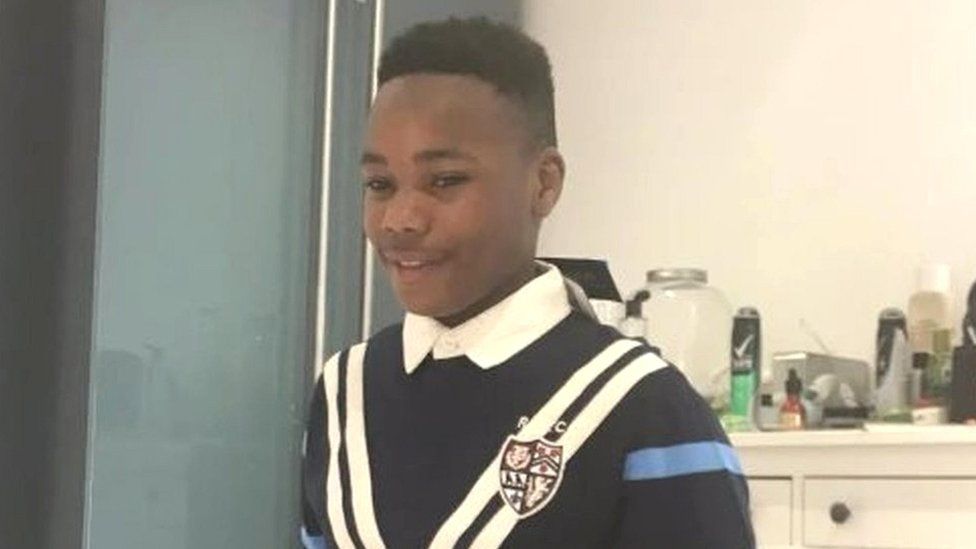Jaden Moodie: 'Chances missed' to protect boy groomed by dealers
- Published

A boy who was "butchered" in a drugs turf war after being groomed by drug dealers had been arrested in a crack den months earlier but police did not contact child exploitation staff, a report has found.
Jaden Moodie was 14 when he was knocked off his moped and stabbed to death in east London in January 2019.
A serious case review found chances to protect him were missed by agencies.
Ayoub Majdouline was jailed in December for his murder.
Jaden's family said they agreed with "many of the findings" of the report.
The family's lawyer, Alice Hardy, said the report showed Jaden "was failed by the system".
"Jaden was both homeless and out of school at the time of his death, both of which could have been prevented," she said.
"The report shows there is no effective system in place to respond and help children at risk from exploitation through county lines."
What is County Lines?
Three months before his death, Jaden was found with an older boy in a flat in Bournemouth known to be used by county lines drug gangs with 39 wraps of crack cocaine, two packets of cocaine, a mobile phone and £325 in cash.
According to the review, the appropriate adult who sat in on his police interview said he appeared to be "a vulnerable young person frightened by what he was being groomed and coerced into by others".
He gave the impression that "he definitely wanted to find a way out of the mess he was getting into", they said.
Following his release, two Dorset Police officers drove him home to London but did not involve specialist child exploitation workers.
A spokesman for the force said it "liaised and worked with the family and social services in Waltham Forest and Dorset to find the best solution to returning Jaden home".
"The most viable solution at that time was for Dorset Police to safely escort him home to his family," he said.
In the 12 months to August 2019, Dorset Police found 36 children from London in Bournemouth in similar circumstances to Jaden.
Jaden's school in Waltham Forest was not told about the arrest but excluded him for a separate incident.
At the time of his death Jaden was living with his grandmother in Leyton.
His mother, Jada Bailey, had been sleeping on friends' sofas while she waited to be rehoused.
She had told housing officers she was trying to keep her son out of trouble and was keen to find somewhere for them to live in Waltham Forest, the report said.
She was allocated a flat two weeks before Jaden was stabbed to death.
The review found Ms Bailey and Jaden's housing needs "could have been handled in a timelier manner", especially as his vulnerability to exploitation became clear.
Jaden's father Julian Moodie was convicted of drug dealing in 2009 and deported to Jamaica a year later, when Jaden was a young boy.
He began getting into trouble after starting secondary school in Nottingham in 2015, the report said.
He ran away from home, was accused of bullying and Ms Bailey was threatened at knifepoint when someone came looking for Jaden.
The report said Jaden had only spent three of his last 22 months in school.
In November 2018, he was excluded from school in Waltham Forest after he was seen in a Snapchat video in his school uniform holding what appeared to be a gun.
Jaden pleaded guilty in court to possession of an imitation firearm in a public place.
By the end of December Jaden had been offered a place at a pupil referral unit and had committed social workers and youth offending workers trying to help him.
But "tragically none of these people were provided with that opportunity", the report concluded.
The review was led by John Drew, the former chief executive of the Youth Justice Board for England and Wales.
Mr Drew highlighted poor communication between Waltham Forest Council's social services, Dorset Police and the Met Police.
He called for a national system for responding to exploitation of children by county lines gangs, saying that every area needs a "rescue and response" system to protect young people.
Mr Drew concluded that "no-one knew how little time" there was to change Jaden's thinking.
Jaden's death "could not have been anticipated on the basis of what was known about [his] life at that time", Mr Drew said.
"So while it is clear that [Jaden] was not protected either by the council, or its partners, or by any other person, from the ultimate danger that engulfed him, I do not find any major fault in the response to his circumstances."
Leader of Waltham Forest Council, Clare Coghill, called the report "an excellent piece of work".
The council has "taken on board all of the recommendations", she said.
"We really hope the government takes on board the recommendations in relation to county lines. We need co-ordination and leadership form central government," she said.
A spokeswoman for the Met Police said: "Our thoughts and sympathies remain with Jaden's family.
"While no specific recommendations have been made for the Met Police, we continue to work closely with Waltham Forest Safeguarding Children's Board to ensure we are communicating and working with all other agencies in the best possible way to safeguard vulnerable children in the borough."
- Published18 December 2019
- Published11 December 2019
- Published23 November 2019
- Published31 December 2018
- Published21 September 2018